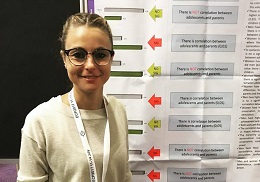
Anna has received the 2017-2018 Outstanding PhD Award for her doctoral thesis “El perfil diferencial de menors amb mesures judicials i menors adaptats socialment, processos cognitius, emocionals i entorn sociofamiliar” (‘The differential profile of minors with judicial measures and socially adapted minors, cognitive and emotional processes and socio-familiar environment’), directed by Mª Luisa Garcia-Merita, emeritus professor of the University of Valencia of the Department of Personality, Evaluation and Psychological Treatment; Paula Samper Garcia, professor of the Department of Basic Psychology and Francisco Luis Atienza González, professor of the Department of Personality, Evaluation and Psychological Treatment.
She got a Degree in Psychology in 2012 at the University of Valencia, she took the Master’s Degree in Developments in Research and Treatment in Psychopathology and Health at the same institution. In 2014 she began her doctorate studies. She enjoyed the Talent Attraction Fellowship of the University of Valencia and completed a second master’s degree in General Health Psychology. She wanted to do an international thesis, so she made two stays abroad, in Italy and Buenos Aires. Upon finishing it, she opted for a postdoctoral scholarship from the ONCE foundation, and currently works as a tenure-track 1 professor in the Basic Psychology Unit.
What difficulties have you encountered while undertaking the thesis?
I have encountered two difficulties. The first one is statistics, since I am from the Department of Basic Psychology, and not from the statistical one, therefore, doing the whole statistical part was a bit more difficult for me because I do not have much training in that field. The second one was that part of the sample of my thesis are minors with judicial measures, which is a bit complicated because many have cognitive problems and to pass them the entire battery of questionnaires was quite difficult.
What continuity does your research have?
Continuing with the same line of research at the university, including longitudinal studies.
What do you think your research contributes to the scientific community as a whole and to society? And to you?
Firstly, the methodology used is interesting, since it can serve as an example for other studies and, on the other hand, having a representative sample of juvenile fecilities, which is currently a little investigated field. Finally, it is also interesting the comparison between young people who are in a juvenile facility and those who are not and study in a high school.
Personally, doing this work has meant a great personal improvement, since I have a disability. I have also had the opportunity to meet other realities different from mine, such as the young people to whom I have passed the questionnaire, and also, it has allowed me to live in two different countries.
What applicability can your work have?
My work, as it analyses the differences between the sample that has committed crimes and those that have not, could be the basis for possible intervention programs, because as we know what leads young people in juvenile centres to delinquency, we could establish a work program with them, reinforcing the necessary points, in order to prevent them from committing crimes.
Does getting a Doctorate facilitate employability?
Of course, I have achieved a position of tenure-track 1 professor thanks to having done the thesis.
Would you recommend starting doctoral studies? What advice would you give to a person who wants to get a PhD?
Yes, I totally recommend it. My advice would be: patience and perseverance. Being that little ant that is working little by little, but that works every day and in the end achieves its aim. And do not get anguished with the final bureaucracy because, although it’s complicated, it ends.
Have you actively participated in outreach activities and scientific communication? How important do you think these activities are?
Yes, I am part of the research group, EVAIN (Evaluation and intervention in Adolescence - https://evain.es) and we do orientation sessions for the schools and institutes that participate in our research. We deal with topics such as aggressiveness, drug use, how to make intervention programs, etc.

.jpg)







